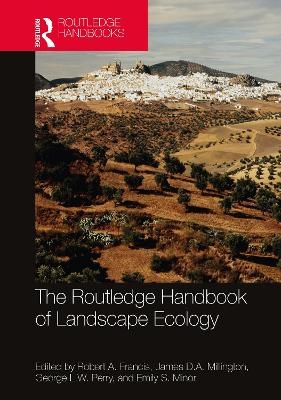
The Routledge Handbook of Landscape Ecology
Routledge (Verlag)
978-1-032-04394-4 (ISBN)
The Handbook provides a supporting guide to key aspects and applications of landscape ecology to underpin its research and teaching. A wide range of contributions written by expert researchers in the field summarize the latest knowledge on landscape ecology theory and concepts, landscape processes, methods and tools, and emerging frontiers.
Landscape ecology is an interdisciplinary and holistic discipline, and this is reflected in the chapters contained in this Handbook. Authors from varying disciplinary backgrounds tackle key concepts such as landscape structure and function, scale and connectivity; landscape processes such as disturbance, flows, and fragmentation; methods such as remote sensing and mapping, fieldwork, pattern analysis, modelling, and participation and engagement in landscape planning; and emerging frontiers such as ecosystem services, landscape approaches to biodiversity conservation, and climate change. Each chapter provides a blend of the latest scientific understanding of its focal topics along with considerations and examples of their application from around the world.
An invaluable guide to the concepts, methods, and applications of landscape ecology, this book will be an important reference text for a wide range of students and academics in ecology, geography, biology, and interdisciplinary environmental studies.
Robert A. Francis is Reader in Ecology in the Department of Geography at King’s College London. His research focuses on urban ecology, freshwater ecology, and nature and society interactions. He edited A Handbook of Global Freshwater Invasive Species and co-edited Urban Landscape Ecology: Science Policy and Practice (with James D.A. Millington and Michael A. Chadwick) and The Routledge Handbook of Biosecurity and Invasive Species (with Kezia Barker), all by Routledge. James D.A. Millington is Senior Lecturer in the Department of Geography at King’s College London. He is a geographer and landscape ecologist with expertise in using computational and statistical modelling tools to investigate spatial ecological and socio-economic processes and their interaction. Research topics include agent-based modelling, ecological impacts of land use change and disturbances (particularly wildfires), and telecoupling. He is the co-editor of Urban Landscape Ecology: Science Policy and Practice (with Robert A. Francis and Michael A. Chadwick). George L.W. Perry is Professor in the School of Environment at the University of Auckland. His research is focused on the dynamics of forest ecosystems at spatial scales from the population to the landscape and at temporal scales from decades to millennia. Emily S. Minor is Associate Professor of Biological Sciences at the University of Illinois at Chicago. Her research explores human alteration of the landscape and how this can affect ecological communities and processes at the landscape scale.
1. Introduction: A brief history and overview of landscape ecology Part 1: Theory and Concepts in Landscape Ecology 2. Landscape mosaics and the patch-corridor-matrix model 3. Scale and hierarchy in landscape ecology 4. Landscape connectivity Part 2: Landscape Processes 5. Spatially structured ecosystems, connectivity and movement 6. Habitat fragmentation 7. Nutrient flows in the landscape 8. The disturbance regime concept 9. Impacts of climate changes and amplified natural disturbance on global ecosystems 10. Change from within: Bottom-up disturbances of ecosystems Part 3: Methods and Tools for Landscape Ecology 11. Fieldwork in landscape ecology 12. Remote sensing and mapping of landscapes 13. Sensor networks for landscape ecology 14. The role of palaeoecology in understanding landscape-level ecosystem dynamics 15. Landscape pattern analysis 16. Quantitative modelling and computer simulation 17. Landscape character assessment and participatory approaches 18. Experimentation in landscape ecology Part 4: Landscape Ecology Frontiers 19. Landscape ecology contributions to biodiversity conservation 20. Ecosystem services in the landscape 21. Riverscapes 22. Landscape restoration 23. Landscapes and climate change
| Erscheinungsdatum | 06.09.2021 |
|---|---|
| Zusatzinfo | 16 Tables, black and white; 77 Line drawings, color; 32 Halftones, color; 109 Illustrations, color |
| Verlagsort | London |
| Sprache | englisch |
| Maße | 174 x 246 mm |
| Gewicht | 1060 g |
| Themenwelt | Naturwissenschaften ► Biologie ► Ökologie / Naturschutz |
| Technik ► Umwelttechnik / Biotechnologie | |
| Weitere Fachgebiete ► Land- / Forstwirtschaft / Fischerei | |
| ISBN-10 | 1-032-04394-6 / 1032043946 |
| ISBN-13 | 978-1-032-04394-4 / 9781032043944 |
| Zustand | Neuware |
| Informationen gemäß Produktsicherheitsverordnung (GPSR) | |
| Haben Sie eine Frage zum Produkt? |
aus dem Bereich


